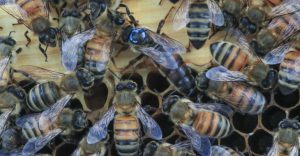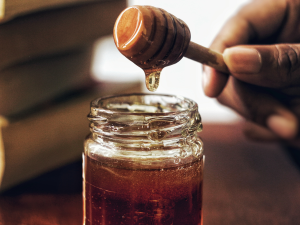Beekeepers say state’s sprays killed their bees
California beekeepers say state Parks and Recreation officials did not notify them before spraying aquatic weeds with herbicides on the Tuolumne River. Beehives could be seen next to the river. About 300 hives of honeybees were killed during the spray operations.
“I’m just amazed that growers have to report to us and give us the option to move our bees, yet the state, county and cities don’t have to do that,”
A program designed to protect honeybees from pesticides and herbicides exempts the very government agencies tasked with protecting honeybees.
Late last summer two Stanislaus County, Calif., beekeepers reported significant bee losses after they discovered state officials directly spraying their bees with herbicides used to treat invasive aquatic weeds on the Tuolumne River southeast of Modesto. When questioning crews spraying hyacinth and Egeria densa from air boats, Steve House, one of the beekeepers who lost tens of thousands of dollars’ worth of bees, was told the crews were using Roundup on the aquatic weeds, which were covered with bees using them as platforms to drink water from the river.
A video House shared shows aquatic weeds in the river and along the riverbank being sprayed from an air boat. Adjacent to the river are dozens of honeybee hives. Bees can be seen flying in the video.
A program implemented a few years ago to inform beekeepers of agricultural spray operations and allow them to relocate bees ahead of crop treatment operations apparently exempts government and vector control operations.
House tells Western Farm Press that he contacted the Stanislaus County Agricultural Department, who referred him to the California Parks and Recreation’s Aquatic Invasive Species Programs. In a letter to that agency from House’s wife, Merinna May-Wesely, she spelled out the loss of 243 strong hives that months later would be used for almond pollination efforts. A neighboring beekeeper reportedly lost 66 hives from the spray activities.
State parks officials did not immediately respond to an email from Farm Press on Jan. 13 seeking comment.
While state law exempts state agencies, including vector control companies treating for mosquitos from notifying beekeepers, those same beekeepers are encouraged through legal penalties to register their hives in local counties through the Beewhere Program.
That program is a comprehensive apiary registration and notification program developed in collaboration with the California Agricultural Commissioners and Sealers Association, California Association of Pest Control Advisors, California Department of Food and Agriculture, and the California Department of Pesticide Regulation. It affords beekeepers, PCA’s, and pesticide applicators a web-based portal and notification through several spray applicator software vendors, the ability to know where bees are located before pesticide and herbicide applications are made. The goal: protect honeybees from chemical spray applications.
House said he is still trying to garner attention and support from farm groups and others over his plight. Though May-Wesely’s letter to the California Parks and Recreation spells out her financial losses and “restitution for damages,” they say they have not received a response from the state.
“I’m just amazed that growers have to report to us and give us the option to move our bees, yet the state, county and cities don’t have to do that,” House said.
In an age where California officials will quickly fine private pesticide applicators for violating such laws, the state needs to take the lead and demonstrate how to responsibly work with beekeepers to protect honeybees.
Beekeepers say state’s sprays killed their bees (farmprogress.com)









